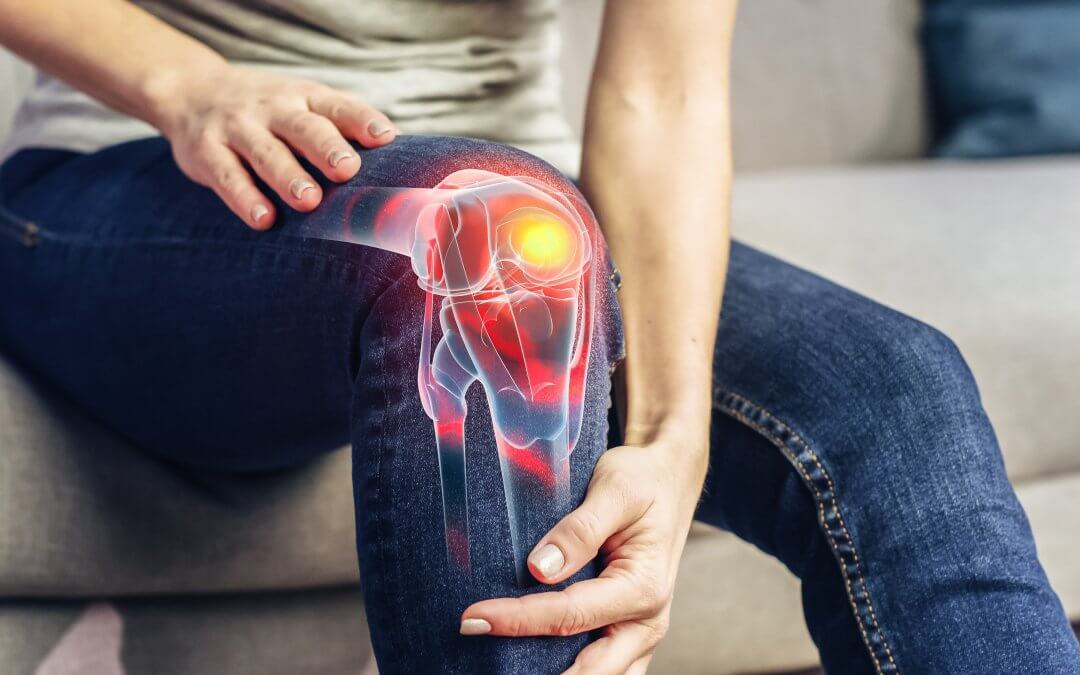As the world population ages, osteoarthritis (OA), a degenerative, “wear-and-tear” form of arthritis which most often occurs during middle age and onwards,[1] becomes more common and therefore more burdensome. Knee osteoarthritis, in particular, is a major cause of work loss and disability.[2] Because of this, researchers have been seeking more effective treatments for the condition through studies and clinical trials. One such recent trial focused on injections of mesenchymal stem cells (MSCs) derived from the placenta.
What is knee osteoarthritis?
In a healthy knee, smooth articular cartilage cushions the bone ends, allowing easy movement, aided by shock-absorbing wedges of cartilage called the menisci.[3] Knee osteoarthritis involves the progressive breakdown of this cartilage, reducing the protective space and potentially leading to bone-on-bone contact. Consequently, the affected joint becomes painful and stiff. Bony growths may also develop, deforming the bones and joint and potentially further limiting range of motion.[4] Quality of life for sufferers is severely reduced as a result,[5] particularly as knee osteoarthritis often involves both knees.[6]
The knee is one of the most common joints to be affected by osteoarthritis,[7] which itself is the most common type of arthritis in the UK[4] and worldwide.[8] Osteoarthritis is a long-term, chronic condition, affecting hundreds of millions of people worldwide[2]. It is currently considered incurable,[4] mainly due to the inability of available treatments to reverse damage to the joint.[9]
Knee osteoarthritis treatment options
Current treatment strategies for knee osteoarthritis focus mainly on managing symptoms and improving function.[10] These commonly include lifestyle modifications like regular low-impact exercise and weight management, as well as the use of supportive devices such as braces and canes, to reduce the strain on the knee. Pain relief medication is also common, as is physical therapy.
In cases where conservative treatment does not work sufficiently, doctors then look at surgical interventions. These could include injections such as corticosteroids, for pain relief, or hyaluronic acid, to provide some cushioning for the joint.[9] In severe cases, doctors may consider joint reshaping or joint replacement surgery.[9][10]
Researchers are constantly exploring new treatments for osteoarthritis that might address the underlying joint changes more directly. Of particular interest is regenerative medicine, including the use of MSCs. These powerful stem cells can differentiate into specialised cell types, including bone (osteoblasts) and cartilage (chondrocytes). Moreover, they have self-renewal capabilities and can provide an immune-suppressive, anti-inflammatory effect.[11]
There are several sources of MSCs, with those derived from bone marrow and fat having been investigated more so than those derived from perinatal (birth-related) tissues, such as the placenta and umbilical cord. This gap in the research is what this recent study aimed to address.[11]
What did the study find?
The primary goal of the study was to assess the safety and effectiveness of repeated placenta stem cell injections for knee osteoarthritis.[11]
The study enrolled a total of 26 patients who had been diagnosed with moderate to severe knee osteoarthritis. The participants were divided into two groups – a treatment group and a control. The treatment group received a series of three injections of placenta MSCs and hyaluronic acid directly into the knee joint, spaced four weeks apart. The control group, on the other hand, received only hyaluronic acid, at the same interval.
Researchers then assessed patients at the 6- and 12-month mark following the first injection. Progress was tracked using self-reported questionnaires measuring pain (VAS) and functionality (WOMAC), as well as through an MRI. Blood samples were also analysed for signs of inflammation.
Results showed that the injections of placenta MSCs were safe. Some patients experienced temporary joint pain or swelling after the injections. However, these issues resolved within a week and there were no serious side effects. In terms of effectiveness, the group receiving the stem cell treatment reported improvements in pain and joint function compared to the control group at both the 6- and 12-month mark. MRI analysis found no differences in cartilage thickness between the groups. Blood sample analysis, on the other hand, found reduced signs of inflammation in the treatment group, indicating the treatment had an anti-inflammatory effect.
Future treatment potential
It is important to realize that more extensive research is needed to confirm the effectiveness of placenta stem cell injections for knee osteoarthritis. Although very promising, the results come from a small-scale, phase 1 trial. Moreover, the trial was open-label, meaning patients were aware of whether they were receiving the MSC treatment. As a result, reporting of improvements could have been biased in favour of it.
The placenta stem cells used in this study are not the only promising treatment being investigated for osteoarthritis. In a separate study, for instance, cord blood stem cells were shown to help regenerate stronger knee cartilage. In the future, these powerful perinatal stem cells could provide an effective treatment not just for osteoarthritis, but also for many other illnesses and conditions currently considered incurable. To learn more about how you could preserve these stem cells for your baby, fill in the form below to receive your free guide.
References
[4] NHS (2023). Osteoarthritis. https://www.nhs.uk/conditions/osteoarthritis/
[6] NHS (2019). Symptoms – Osteoarthritis. https://www.nhs.uk/conditions/osteoarthritis/symptoms/
[10] NHS (2023). Treatment – Osteoarthritis. https://www.nhs.uk/conditions/osteoarthritis/treatment/
FIND OUT MORE, REQUEST YOUR WELCOME PACK TODAY
All you need to know to make an informed decision.
Provide your contact details to request:
– Complete Welcome Pack and Parent’s Guide
– Information via email
– Contact from our specialist advisors









